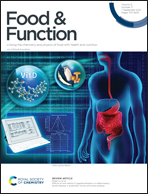Maternal n-3 polyunsaturated fatty acids restructure gut microbiota of offspring mice and decrease their susceptibility to mammary gland cancer
Abstract
Our previous studies have revealed that a maternal diet rich in n-3 polyunsaturated fatty acids (PUFAs) is associated with decreased mammary cancer risk in offspring. However, the underlying mechanism remains unclear. The present study aimed to investigate the possible mechanism by which maternal n-3 PUFAs decrease the mammary cancer risk of offspring in terms of gut microbiota. C57BL/6 pregnant mice were fed a control standard chow (CON), fish oil supplemented diet (n-3 Sup-FO), flaxseed oil supplemented diet (n-3 Sup-FSO) or n-3 PUFA deficient diet (n-3 Def) (n = 10) throughout gestation and lactation. After weaning, all offspring were fed a AIN-93G diet. The tumor incidence and volume were significantly increased in n-3 Def offspring compared with the other groups. Maternal n-3 PUFA supplementation resulted in a significantly increased α-diversity of the gut microbiota in n-3 Sup-FO and n-3 Sup-FSO offspring compared with that in n-3 Def offspring. The relative abundances of Akkermansia, Lactobacillus and Mucispirillum observed in adult offspring of both the n-3 Sup-FO and n-3 Sup-FSO groups were higher than those observed in the control group, whereas the maternal n-3 Def diet was associated with decreased abundances of Lactobacillus, Bifidobacterium and Barnesiella in 7-week-old offspring. The levels of the pro-inflammatory factors IL-1β, IL-6 and TNF-α were significantly lower in n-3 PUFA supplemented offspring than in n-3 Def offspring. In addition, the abundance of Mucispirillum was positively associated with the concentration of the anti-inflammatory factor IL-10, whereas the abundances of Bifidobacterium and Akkermansia were negatively associated with IL-1β and IL-6, respectively. Based on the bacterial composition of the gut microbiota, metabolites were predicted and the results showed that arachidonic acid metabolism and the MAPK signaling pathways were more enriched, while the butyric acid metabolic pathway was less enriched in offspring of the n-3 Def group than in those of the other three groups. Our findings suggest that decreased pro-inflammatory factors and changed gut microbiota are associated with the protective effects of maternal n-3 PUFAs against offspring's mammary tumorigenesis.



 Please wait while we load your content...
Please wait while we load your content...